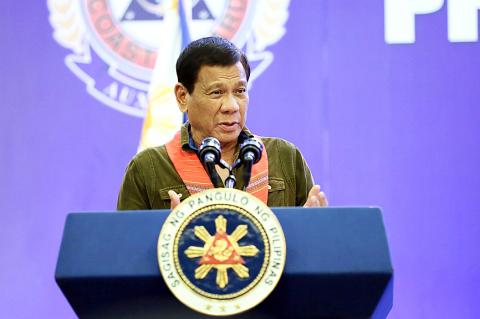Philippine President Rodrigo Duterte said China threatened to go to war after he asserted the Southeast Asian nation’s sovereignty over disputed territory.
In an unspecified meeting with Chinese President Xi Jinping (習近平), Duterte said he would drill for oil in the South China Sea, citing an international arbitration tribunal ruling upholding the Philippines’ claim.
That prompted a retort from Xi, Duterte said.

Photo: AFP
“Well, if you force this, we’ll be forced to tell you the truth. We will go to war. We will fight you,” Duterte on Friday quoted Xi as saying.
Duterte did not say when and where the conversation took place.
Calls and an e-mail seeking comment from the Chinese Ministry of Foreign Affairs outside of regular office hours were not immediately answered.
Since Duterte took office in June last year, the tough-talking 72-year-old leader had repaired fractured ties with China, touting the economic benefits including US$24 billion of loans and investment.
China’s efforts to assert its dominance over the South China Sea, where more than US$5 trillion in annual trade is ferried, have in the past angered Southeast Asian nations with competing claims, such as Vietnam and the Philippines.
The Philippines won a ruling by the Permanent Court of Arbitration in The Hague, Netherlands, in last July last year that rejected China’s assertion to the territory.
China has said the tribunal has no jurisdiction over sovereignty disputes.
China’s claim is “far away,” Duterte said in the southern Philippine city of Davao, recalling what he told Xi.
“It’s almost alien to us to hear those words because we were never under Chinese jurisdiction,” he said.
Separately, officials from the two countries agreed to discuss “mutually acceptable approaches” to South China Sea issues during a bilateral consultation in the Chinese city of Guiyang on Friday, according to a joint statement released by the Philippine Department of Foreign Affairs.
Handling incidents and disputes in an appropriate manner is important, they said.
The next discussion is to be held in the Philippines in the second half of the year.

CHAOS: Iranians took to the streets playing celebratory music after reports of Khamenei’s death on Saturday, while mourners also gathered in Tehran yesterday Iranian Supreme Leader Ayatollah Ali Khamenei was killed in a major attack on Iran launched by Israel and the US, throwing the future of the Islamic republic into doubt and raising the risk of regional instability. Iranian state television and the state-run IRNA news agency announced the 86-year-old’s death early yesterday. US President Donald Trump said it gave Iranians their “greatest chance” to “take back” their country. The announcements came after a joint US and Israeli aerial bombardment that targeted Iranian military and governmental sites. Trump said the “heavy and pinpoint bombing” would continue through the week or as long

TRUST: The KMT said it respected the US’ timing and considerations, and hoped it would continue to honor its commitments to helping Taiwan bolster its defenses and deterrence US President Donald Trump is delaying a multibillion-dollar arms sale to Taiwan to ensure his visit to Beijing is successful, a New York Times report said. The weapons sales package has stalled in the US Department of State, the report said, citing US officials it did not identify. The White House has told agencies not to push forward ahead of Trump’s meeting with Chinese President Xi Jinping (習近平), it said. The two last month held a phone call to discuss trade and geopolitical flashpoints ahead of the summit. Xi raised the Taiwan issue and urged the US to handle arms sales to

State-run CPC Corp, Taiwan (CPC, 台灣中油) yesterday said that it had confirmed on Saturday night with its liquefied natural gas (LNG) and crude oil suppliers that shipments are proceeding as scheduled and that domestic supplies remain unaffected. The CPC yesterday announced the gasoline and diesel prices will rise by NT$0.2 and NT$0.4 per liter, respectively, starting Monday, citing Middle East tensions and blizzards in the eastern United States. CPC also iterated it has been reducing the proportion of crude oil imports from the Middle East and diversifying its supply sources in the past few years in response to geopolitical risks, expanding

Pro-democracy media tycoon Jimmy Lai’s (黎智英) fraud conviction and prison sentence were yesterday overturned by a Hong Kong court, in a surprise legal decision that comes soon after Lai was jailed for 20 years on a separate national security charge. Judges Jeremy Poon (潘兆初), Anthea Pang (彭寶琴) and Derek Pang (彭偉昌) said in the judgement that they allowed the appeal from Lai, and another defendant in the case, to proceed, as a lower court judge had “erred.” “The Court of Appeal gave them leave to appeal against their conviction, allowed their appeals, quashed the convictions and set aside the sentences,” the judges